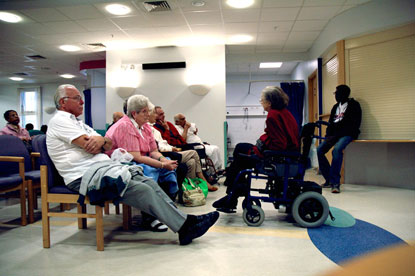By Richard Johnstone | 19 April 2012
Primary care trusts could be overpaying millions of pounds for some hospital treatments due to differing definitions of what an inpatient is, the Audit Commission has warned today.
 The watchdog revealed that a major cause of disputes between NHS commissioners and providers is in the classification of patients who stay in hospital for less than 24 hours. The commission found that identical treatments might be recorded as inpatient at one hospital and outpatient at another.
The watchdog revealed that a major cause of disputes between NHS commissioners and providers is in the classification of patients who stay in hospital for less than 24 hours. The commission found that identical treatments might be recorded as inpatient at one hospital and outpatient at another.The commission’s report, By definition – improving data definitions and their use by the NHS, has warned that the health service suffers from ‘incorrect recording and incorrect payments’ as a result. This inconsistency can lead to charges being more than five times higher for the same treatment.
Andy McKeon, the commission’s managing director for health, said this has serious financial implications. The health service spends £6.8bn a year on routine short-stay treatments, so discrepancies in contract values can cost millions of pounds.
Under the payment by results NHS hospital funding system, all activity is classified according to nationally set definitions, which affects the way each treatment is paid for. Although most of the definitions are clear and properly applied, the commission found the tariffs are sometimes based on data that fails to represent the services provided.
It highlighted an example of a patient who goes to hospital for a simple operation, needing only a short amount of theatre time. In one NHS trust, this would be categorised as an admitted patient day case and they would receive £729. But elsewhere the same activity and treatment could be recorded as a non-admitted outpatient, and the hospital would be paid £116 – 84% less.
McKeon said: ‘Confusion over how to record what has happened to a patient makes it impossible to compare like with like, compromising patient choice. It also makes planning and commissioning care difficult when treatment data gives an unclear picture.
‘We have also found that NHS managers are spending valuable time debating how patient treatment is recorded or described, time that would be much better spent focusing on the treatment itself. The arguments are only likely to increase as money gets tighter, and GPs in clinical commissioning groups begin examining what happens to their patients and how much they are being charged.’
To tackle the problem, the commission recommends that the Department of Health and the NHS jointly create a single point of contact to act as a consistent and authoritative source of guidance.
Responding to the report, a Department of Health spokeswoman said: ‘The NHS must make sure that they are following the updated guidance to record the care they give to patients accurately and consistently to make sure that it gets good value for every pound it spends.
‘When this becomes the responsibility of Monitor and the NHS Commissioning Board we will consider the findings with them to identify further improvements for how data can be collected as accurately as possible.’





















